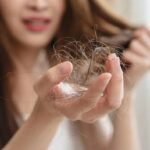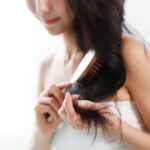Many people experience abnormal hair loss even without a family history of baldness. According to dermatologist Kha Bac Hoan, as shared on Sou, the cause is not solely due to psychological or hormonal factors, but it could also be the shampoo products one uses daily—especially the hidden preservatives in shampoos.
On his personal page, Dr. Kha revealed that most commercial shampoos contain 3 to 5 types of preservatives such as Parabens, MIT (methylisothiazolinone), and DEA (diethanolamine). These ingredients help prolong the shelf life of the product, prevent mold, and avoid deterioration. However, these chemicals can easily irritate the scalp, disrupt the natural microbiome, and damage the protective barrier of the scalp, leading to hair loss and follicle damage.

Worryingly, the consequences of these preservatives often do not appear immediately but accumulate over time. Many people initially experience shiny hair, but after a few months of use, hair starts to fall out excessively. Once the hair follicle is damaged, even if the harmful product is discontinued, it takes at least 3 to 6 months for the scalp to recover.
Particularly, MIT and formaldehyde-releasing agents are potent allergens. When the scalp reacts to these chemicals, it can lead to inflammation, itching, disruption of the hair growth cycle, and premature hair loss. Some people mistakenly believe it is due to dandruff and switch to stronger anti-dandruff shampoos, which contain higher concentrations of preservatives, making the situation worse.
“Why are such dangerous chemicals still widely used? Simply because they are cheap and effective,” Dr. Kha frankly pointed out. A bottle of shampoo may cost less than 1 yuan in preservative expenses but can last for 2–3 years without spoiling. Moreover, some “natural” or “gentle” shampoo products contain even more hidden preservatives to counteract bacterial growth after sulfate removal. This is a “dark secret” that few consumers are aware of.
Given this situation, Dr. Kha advises consumers to consider switching to shampoos with fewer or no preservatives, avoiding being misled by attractive packaging or pleasant fragrances. Sometimes, simpler products are the safest and most gentle choice for the scalp.





































